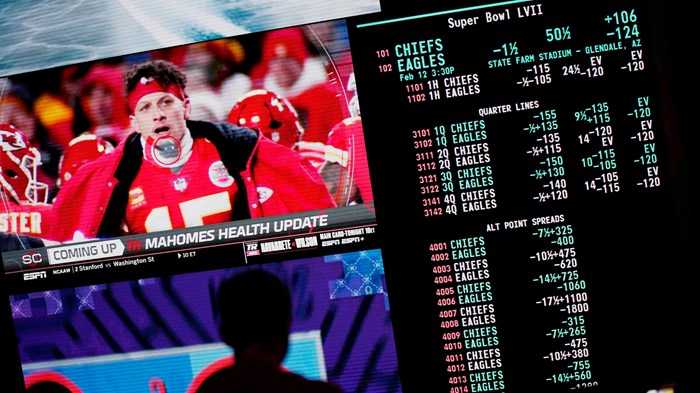
Americans are gearing up to bet billions on the Super Bowl, but the quick expansion of gambling is leaving a trail of addiction in its wake.
Troy Adams is one of those in recovery. When he was a 22-year-old US Marine, Adams went with some other Marines to a Las Vegas casino the weekend before they deployed to Iraq. They played baccarat and won a lot of money. The casino offered them all free rooms and other comps.
“We were young and dumb and didn’t realize why they were doing these things,” he remembered. Years passed without him going to casinos again, but that feeling of winning stuck with him.
Years later, in 2016, he craved that feeling again when a lot of crises piled up: Massive flooding hit his home in southern Louisiana, his brother’s wife died unexpectedly, and his dad was diagnosed with terminal cancer.
“I started going to the casino as an escape,” he told CT. “It became my safe haven and my refuge.” Like any other addiction, he said, “you physically cannot stop. You can’t see a way out.” It began to take over his life.
The science of gambling addiction works similarly to addictive substances. The American Psychiatric Association added gambling to its category of behavioral addictions in 2013, based on research that it is similar to substance abuse in “clinical expression, brain origin, comorbidity, physiology, and treatment.”
It was the first non-substance behavioral addiction to be classified this way, but Americans still don’t see gambling as a potential problem like drugs or alcohol. And churches often don’t see the moral hazards of gambling or the need for recovery ministry for gambling.
Kentucky is one of the few holdout states that hasn’t legalized online sports betting, and Baptists there are using the parallels to the drug crisis to try to halt the legislature’s attempts this session to legalize the industry.
“Kentucky already struggles with drug addiction, and it is immoral for the state to encourage another form of addiction—sports betting,” said Todd Gray, the head of the Kentucky Baptist Convention, in comments to Kentucky Today.
The National Council on Problem Gambling estimates two million Americans meet the “diagnostic criteria” for gambling addiction. (For comparison, about three million Americans have an opioid use disorder.) Being young and male are the highest risk factors. The New York Times reported a 43 percent increase in calls to a national hotline for gambling problems last year.
This weekend, the Super Bowl will draw $16 billion in wagers from Americans, according to the American Gaming Association, up from $7.6 billion last year. The number of Americans planning to place wagers on the game has increased 61 percent from last year, the association found. BetMGM reported that its bets doubled on the Super Bowl in 2022 compared to the 2021 game.
The big game highlights how gambling has exploded since the US Supreme Court removed a ban on sports betting in 2018. Since then, most states have legalized it with few restrictions. Americans bet $92 billion in 2022, according to SportsHandle, a trade publication, up from $58 billion in 2021.
More people are being introduced to gambling. “I haven’t seen an online sports betting ad in almost 7 minutes. Am I dead?” joked comedian Conan O’Brien in a tweet last year. Companies use offers of “risk-free” bets to bring in new customers, reimbursing them for losses. The New York Times in an investigation last year discovered that 18 states made those promotional offers tax deductible for the gambling companies—essentially subsidizing them.
And as has happened in other countries where online sports betting has been legalized, a surge in new people betting means more people with a gambling addiction. As Adams told CT, the problem is that betting can result in a positive outcome—winning money.
But that’s similar to the early days of the opioid crisis, when the drugs were marketed as nonaddictive. Gambling might not be lethal like fentanyl, but the National Council on Problem Gambling has said that the suicide rate among problem gamblers is higher than for any other addiction disorder, and there is a correlation with other substance abuse.
For Adams, Adderall and alcohol use crept in as he stayed up to gamble while working a full-time job. He began stealing money from his cousin’s business and eventually went to jail. He was released into various recovery programs but relapsed and was sent back to jail. His dad died while he was in jail, and he attended the funeral in shackles.
He went in and out of residential recovery programs, some of them better than others, some faith-based and some not. He was “off the bet” for 18 months and then relapsed, and eventually ended up back in jail, and then in another recovery program.
This time the court-ordered recovery program was helpful. After that, he started at a faith-based recovery home that was part of First Bossier, a Baptist church that has one of its pastors focused on recovery ministries.
Adams found a lot of growth there. The church hosts a weekly Celebrate Recovery program that Adams joined in addition to attending a local Gamblers Anonymous meeting. GA and Celebrate Recovery “pretty much saved my life,” he said.
“GA more than anything was the most beneficial—a group of people who understood and didn’t judge you,” he said. “The only two groups of people I’ve met in the world that are not judgmental—or they’re compassionate and understanding—are real Christians and people in recovery. … God still loves me, and I try to live my life that way.”
Recovery ministry veterans see resources
Janet Jacobs has been connecting churches and individuals with gambling-addiction recovery resources for more than 20 years through Gambling Recovery Ministries, affiliated with the United Methodist Church (UMC). She didn’t know anything about gambling addiction when she started the ministry in 2001 at the request of her bishop.
“The UMC, their particular doctrine with regard to gambling is, ‘No,’” quipped Jacobs. “You don’t gamble.”
Now, as well as in 2001, she found very few faith-based resources for gambling addiction recovery. Churches rely on general addiction recovery ministries to help someone with a gambling problem, she said.
One benefit of more than a decade in the pits of an opioid crisis is that churches do have more addiction recovery resources than in the past. But some problem gamblers, she finds, want more specific help than drug or alcohol recovery.
Jacobs said the US Catholic Church has an outreach for its priests or nuns with a gambling problem at a Catholic treatment center, but not something specific for parishioners.
“There really is very little in terms of faith-based outreach to problem gamblers and their loved ones. … It gets lumped in all the different addictions,” she said.
She says there are a lot of non-faith-based resources for addicted gamblers: She finds Gamblers Anonymous meetings and Gam-Anon meetings to be very helpful. She encourages people who may not like a particular GA meeting they visit to try a different GA group that might have a different feel. For churches who want to do outreach, she says they can start by contacting GA and offering to host GA meetings at their facility. That starts relationships, she said.
“Many faith-based organizations or fellowships just don’t go beyond that,” she said. But, “you have to start somewhere.”
Some areas of the country may lack counselors certified in gambling addiction, but she says those certified through the International Gambling Counselor Certification Board “know what they’re talking about.” As a volunteer there, she started a clergy track at the board about a decade ago to offer additional training and certification. She recommends that kind of counseling treatment alongside GA or Celebrate Recovery.
Deborah Haskins, a clinical counselor, got that clergy certification, and she has been training other clergy on this issue. She recently held a training for 16 people from an African-descent Pentecostal church in Delaware.
“We need more faith leaders to understand this is a public health concern,” she told CT. With the recent blanket advertising, “more folks will become addicted. … We are where we were years ago with drug addiction. People still see it as a character defect versus a brain disease.”
Parents look for recovery options for their children
Lisa Gwatney’s son began gambling with friends in college. Soon after he graduated, sports betting became legal. He was an athlete, he was competitive, and, his mom said, he is good with numbers—so he was winning, and he was drawn in.
He gambles on his phone now all the time, Gwatney says. Casinos have targeted him, she said, giving him promos, free alcohol, and flying him out to Las Vegas. He’s tried to self-ban from apps and casinos with his mom’s help, but she said the casinos will offer free rooms in another state where he hasn’t self-banned.
“When people say, ‘What’s the big deal?’ I’m telling you it’s a very big deal,” Gwatney said. “We had this kid with so much promise and watched him be systemically destroyed by an industry that doesn’t care if he’s dead.”
Les Bernal at Stop Predatory Gambling has noted that betting companies ultimately want sports betting users to move to casino games—because then users are playing against the house.
“The states want the money,” Gwatney said. “The losses of addicted people are just acceptable consequences for them.”
Solutions were hard to find, Gwatney said. She found one of the few GA meetings in the area and went with her son to it, only to discover it had stopped meeting. She called the national hotline but said they didn’t have any resources to give to a parent, only to the person with the addiction.
In desperation about a year ago, Gwatney got her pastor and friends to hold an intervention for her son. Their friends were surprised he had an addiction. She did her own research and found a professional to guide them through it, having everyone write him letters and cut him off financially. She asked him to stay and get help in Tennessee, but she said a casino had just offered him free rooms in Detroit—and he went there.
After, she wasn’t sure the intervention was the right choice. She had read a book about drug addiction, Unhooked, which helped her understand the principles of addiction at work in her son. It noted that forcing an addict into recovery rarely works, that the person needs to want help.
She has asked herself what she might have done wrong as a parent—she and her husband had rules for him; they loved him. She cautions other parents to warn their children about gambling the same way they would warn them about drinking and driving or not leaving a drink unattended at a party.
“If I could take this burden from him, I would take it,” said Gwatney.
Friends continue to pray for her son, and Gwatney prays a prayer from a card for a prodigal son every day. It starts, “Lord, protect my son. Build a hedge around him …”
She wakes up every day, she said, and checks her phone to see if her son is alive. She doesn’t know how someone without faith in God could bear something like this. But she was convicted recently that the shame about what her son was going through was a sign “that the Devil wanted to separate us from God’s grace.” She has bought her son health insurance in the hope that maybe he could go into a residential rehab program when he’s ready.
“The folks who are not keeping up with this—even halfway keeping up—are really losing out in terms of outreach to help people,” said Jacobs from Gambling Recovery Ministries.

Support Our Work
Subscribe to CT for less than $4.25/month


















